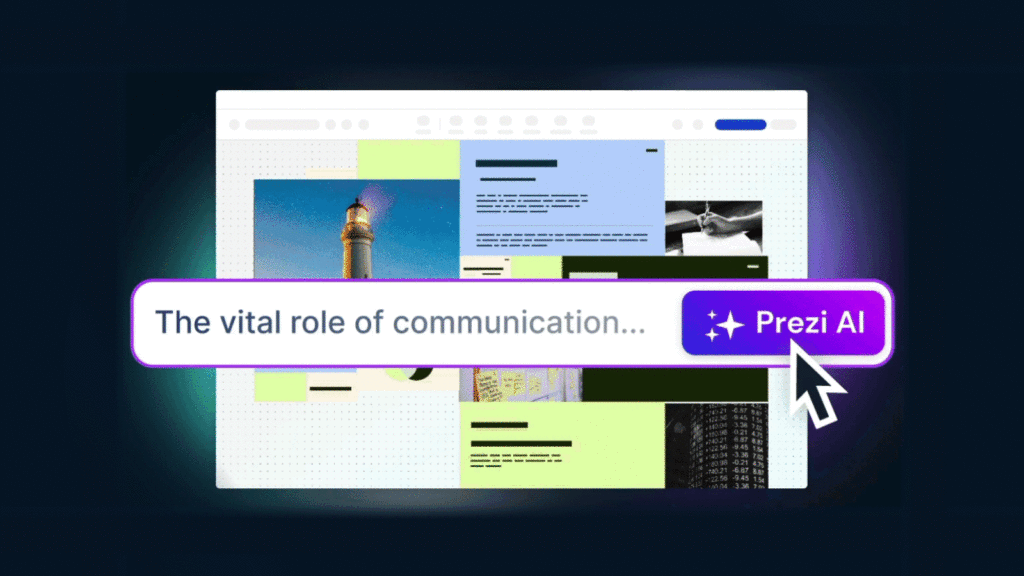Persuasive speech is a form of communication where you convince the audience to agree with your argument and motivate them to take action. The best speeches will feature topics that are thought provoking and interesting to both you and your audience. Check out our list of great persuasive speech ideas to help you get started, as well as general tips to make any presentation more persuasive.

Top 8 persuasive speech ideas
Below are 8 persuasive speech ideas, each with the potential to spark discussion and engagement with your audience.
1. Does the working environment affect employee productivity?
Many have heard the old adage, “A happy worker is a productive worker.” Much of an employee’s happiness can come down to the environment they work in. Discuss how improving the company work environment can help increase employee happiness and, in turn, their productivity. Make suggestions on ways certain businesses can improve their work environment.
2. Are innovation and adaptation crucial to driving a business forward?
In almost any market, it’s important to stay on top of current trends as well as to continue to innovate, offering products and services that your company’s target market will need. Discuss the importance of adapting to the changing market and focusing on innovation to stay competitive in the industry. Talk about some ways in which a company can drive innovation.
3. Is brand awareness the most important part of a marketing strategy?
Marketing is how you present your company to your desired target market. While there are a number of factors of marketing that create this presence for your customers, brand awareness can be one of the most critical. Discuss the ways in which a company can improve its brand presence and how consistency is vital to success.
4. Should businesses outsource more or keep all they can in-house?
Outsourcing is becoming more and more prevalent in business. Many companies try to tackle all they can in-house, whether to save money or to maintain total control over how the company is presented. Discuss the pros and cons that come from outsourcing and make some suggestions on which types of work are more commonly outsourced than others.
5. Is it better to cater your business marketing to a niche audience?
Determining your company’s target market is one of the most critical steps when establishing a marketing plan. While all companies are happy to have every consumer as their customer, trying to cater to everyone is often difficult. Discuss the pros and cons of catering to a niche market versus a wider market.
6. Should all businesses eventually focus on global expansion?
Businesses are designed to grow and evolve, and often that means the possibility of global expansion. But is this option right for every type of company? Discuss some situations and business models where global expansion should be a primary focus and situations and businesses where it does not need to be the end goal.
7. Is online marketing as effective as it once was?
In the modern workplace, the quickest and easiest way to reach your target market is through digital means. Yet, with an increasing barrage of emails and online ads, it’s hard to tell how effective this type of marketing still is. Discuss when online marketing can still be effective and other marketing methods that can support it and help improve your marketing plan.
8. Should a business focus on its online presence more than any other marketing facet?
Some companies rely completely on an online presence while others make online marketing a key component of their marketing plan. Discuss the benefits of maintaining an effective online presence in the digital world and provide some ways that a company can improve its online presence and strengthen it.
Persuasive speech tips
When preparing a persuasive speech, try to keep the following tips in mind so that you stay focused on your goal and deliver a convincing speech.

Always keep your end goals in mind
The purpose of a persuasive speech is to engage your audience and convince them to believe in something that you believe in. Keep your goal in mind throughout the whole presentation and make sure that your word choice and each fact you share backs up your argument. A key persuasive speech tip is to stay focused – avoid spending too much time on backstory and anything that can be construed as a complaint. Your audience needs to know why they should side with your argument. If there is something bad you are mentioning in your speech, don’t just inform them about it or complain about it, convince them to take action.
Establish credibility in your opening
You will want to establish yourself as a reliable source as early as possible at the beginning of your speech. The sooner you gain your audience’s trust, the easier it will be for them to see the validity of your points. You can build credibility through storytelling – use a specific instance where a situation occurred or provide examples that resonate with people on an emotional level.
Use storytelling effectively
Incorporating storytelling into your persuasive speech topics can bring abstract concepts to life, making them more relatable and impactful. Through storytelling, you can transform your good persuasive speech topics into memorable narratives that resonate on an emotional level.
Consider framing your storytelling-driven ideas as questions:
- What can the journey of a single plastic bottle teach us about waste and opportunity?
- How do personal stories of triumph over mental health challenges inspire change?
- Can the ripple effect of kindness in a community truly make a difference?
Choosing narratives that are relevant and impactful will make your persuasive speech topics a compelling and memorable experience, encouraging your audience to see the world from a new perspective.
Establish emotional connection

An essential component of persuasive speech ideas is the ability to establish an emotional connection with your audience. Emotions play a crucial role in decision-making and can significantly influence an audience’s receptiveness to your message. To achieve this, focus on storytelling, sharing personal experiences, or presenting hypothetical scenarios that evoke empathy, fear, happiness, or any other emotion relevant to your message. Remember, the goal is to make your audience feel something, as emotion is a powerful catalyst for action. When brainstorming good topics for a persuasive speech, consider angles that allow you to tap into the emotional currents of your audience, making your message not just heard but felt.
Tailor topics by theme
Organizing your persuasive presentation topics by theme allows you to cover a wide range of interests comprehensively. This approach not only structures your content but also ensures it appeals to a diverse audience, enriching your persuasive speech topics with depth and variety.
Technology and ethics
- The intersection of technology and ethics presents a rich field for exploration. Consider these questions:
- Should there be more regulation on technology companies to protect privacy?
- What are the ethical implications of gene editing, and how far should we go?
- Is it time for stricter laws against cyberbullying?
Health and wellness
Health and wellness are universal concerns with a wide range of engaging persuasive speech topics. Explore questions such as:
- Do diet fads do more harm than good in the long term?
- Why is debunking myths about vaccinations crucial for public health?
- How can we improve mental health awareness in schools?
Social issues and justice
Challenging societal norms and advocating for justice are central to many persuasive speech topics. Consider these questions:
- Should the death penalty be abolished, and why?
- What steps can be taken to bridge the gender pay gap for good?
- How can immigration reform be achieved in a humane and practical way?
By framing your examples as questions, you encourage your audience to engage actively with the persuasive speech topics, promoting critical thinking and discussion. This approach not only makes your content more accessible but also more impactful, ensuring your persuasive speech topics not only inform but also inspire and motivate your audience to action.

Leverage social proof
When exploring what are good persuasive speech topics, the power of social proof cannot be overstated. Social proof, in the form of testimonials, expert opinions, case studies, and the like, serves as a powerful endorsement of your argument. Incorporating elements of social proof into your presentation can significantly enhance your credibility and persuade your audience of the validity of your argument. For instance, when discussing what are good persuasive speech topics related to environmental conservation, citing examples of successful conservation efforts or endorsements from reputable environmentalists can bolster your argument and inspire confidence in your audience.
Speak to your audience
Know the audience that you will be speaking to. Your material should be in a format that can directly speak to them. For instance, if your audience knows little about the topic of your speech, use a problem-solution format to first inform the audience of a problem and then provide a valid solution. This, along with citing credible sources, will give your argument more sway.
Understand your audience’s values
Selecting good persuasive speech topics that align with the audience’s core values is key to resonating deeply and fostering a genuine connection. This connection ensures your message goes beyond mere words, inspiring meaningful reflection and action.
Consider questions like these that bridge the gap between your message and their beliefs:
- Should we accelerate the transition to renewable energy to ensure a sustainable future?
- Is the societal impact of artificial intelligence something to embrace or fear?
- In the digital age, how much surveillance is too much?
These inquiries not only serve as persuasive speech ideas but also engage the audience on issues that matter deeply to them. Understanding your audience’s values allows you to tailor your persuasive presentation topics in a way that is both impactful and engaging, ensuring your message is not just heard but felt. Through this approach, you address what are good persuasive speech topics by aligning your speech with the audience’s inherent values and concerns, making for a speech that truly connects and resonates.

Use persuasive language
Word choice is an extremely important element of a persuasive speech. In order to convince your audience to side with your argument, you need to convey confidence and evoke emotions. Some types of persuasive language include:
- Exaggerations
- Expert opinions
- Alliteration
- Anecdotes
- Appeals
- Rhetorical connotations
Tailor content for the digital age
In today’s fast-paced digital world, persuasive speech topics must be crafted with the online audience in mind. With the majority of presentations now taking place virtually, speakers have a unique opportunity to engage with their audience through digital platforms like Prezi. This necessitates the integration of interactive elements such as clickable links, embedded videos, and interactive infographics that allow the audience to dive deeper into the content. When considering good topics for a persuasive speech, think about how your message can be improved with digital content that complements your words, providing a more immersive experience for your audience. This approach not only makes your presentation more engaging but also allows for a broader dissemination of your message through social shares and online discussions.
Support your message with visuals
You can use as many words as you want to articulate your argument, but one powerful image can evoke strong emotions and shift a person’s mindset in a second. For this reason, make sure to incorporate a visual element in your persuasive speech. Prezi’s storytelling format and zoom animations weave visuals into your presentation seamlessly and give your presentation a more conversational feel. This is important in a persuasive speech when you want your audience to feel comfortable and open to new ideas. Learn more about incorporating visual design into your Prezi presentation.
Check out this Prezi presentation to see the power of visuals:
Foster interactive engagement
Gone are the days when a persuasive speech was a one-way communication from speaker to audience. Today, fostering interactive engagement is key to a successful presentation. Encourage your audience to participate by asking questions, conducting live polls, or inviting them to share their experiences and perspectives. This interactive element not only keeps the audience engaged but also provides valuable feedback that can be used to tailor your message in real-time, making it more relevant and impactful. When planning persuasive speech topics, think of ways to incorporate interactive elements that stimulate audience participation and engagement, enhancing persuasive speech ideas.
Building on the importance of fostering interactive engagement in your persuasive speech, consider the following examples of questions that can effectively involve your audience and elevate the impact of your presentation:
Addressing environmental concerns:
“By a show of hands, how many of you have adopted a new daily habit to better the environment over the past year?” This inquiry serves a dual purpose: it measures the environmental awareness among your listeners and motivates them to contemplate their individual efforts towards environmental preservation. Such engagement not only caters to good persuasive speech topics but also fosters a dialogue on straightforward, significant changes that audience members can implement, driving towards tangible, positive environmental action, illustrating what are good persuasive speech topics.
Exploring technology and privacy:
“Who among you believes that your personal data is truly secure online? Please participate using the live poll feature.” This question directly taps into the audience’s concerns and perceptions about online privacy, laying the groundwork for an in-depth conversation on the criticality of data security and the role of personal responsibility in our digital era. Utilizing technology to facilitate immediate audience interaction renders the subject more accessible and urgent, aligning perfectly with persuasive speech ideas that resonate with contemporary audiences, a prime example of persuasive presentation topics.
Highlight the urgency
For persuasive speech topics to truly resonate, they must convey a sense of urgency. This compels the audience to not only agree with your argument but to feel compelled to act upon it. Use statistics, forecasts, and real-life examples to paint a vivid picture of what could happen if action is not taken. Highlighting the immediacy of the issue at hand can motivate your audience to move from passive listeners to active participants. When exploring good persuasive speech topics, choose issues that have a clear and present impact, thereby emphasizing the urgency of your call to action.
Emphasize the call to action
The climax of a persuasive speech is a strong call to action, moving your audience from passive agreement to active participation. This pivotal moment is your opportunity to transform understanding into action, offering clear steps forward.
Inspire action with questions like these, which highlight persuasive speech ideas and persuasive presentation topics:
- What are three simple ways we can fight climate change starting today?
- How can voting in every election change the course of history?
- Why are reducing, reusing, and recycling essential steps for everyone concerned about the planet?
A clear and achievable call to action is crucial for the effectiveness of your persuasive speech, making the difference between agreement and action.
Practice as much as possible

The more you practice, the more comfortable you’ll feel and the more confidence you’ll project. Practice with friends or family members and ask them to provide constructive feedback on areas that can be improved. If you prefer to practice alone, consider recording yourself or delivering your speech in front of a mirror.
By integrating these strategies into your persuasive speech, you not only enhance the effectiveness of your presentation but also ensure that your message is memorable, impactful, and capable of inspiring real change. Whether using Prezi to add a dynamic visual element or tapping into the power of emotion and social proof, the key to a successful persuasive speech lies in your ability to connect with your audience on a deeper level, motivating them to act on your call to action.
Using Prezi AI for compelling presentations
Introduction to Prezi AI

The art of creating persuasive presentations has evolved, and Prezi AI is at the forefront. Prezi is invaluable for anyone working on persuasive speech topics, especially when time is of the essence or design expertise is needed. Prezi AI simplifies the creation process, making it straightforward to assemble a presentation that not only informs but persuades.
Design and flow
When exploring good persuasive speech topics, the design and flow of your presentation are just as critical as the content. Prezi AI helps in bringing your persuasive speech ideas to life by recommending designs, structures, and visuals that complement your message, ensuring it’s delivered in the most engaging way possible. This is particularly beneficial for persuasive presentation topics, where the visual aspect of your argument can significantly influence the audience’s perception and receptiveness.

Enhancing your narrative
Moreover, Prezi AI tailors suggestions to enhance your narrative, pinpointing areas where emphasis could highlight your argument. This feature is especially helpful when addressing what are good persuasive speech topics, as it helps to refine your message for clarity and impact.
On-the-go presentation creation
For those seeking good topics for a persuasive speech on the go, Prezi AI’s user-friendly interface and intelligent design suggestions enable quick and effective presentation development. This ensures that your persuasive speech topics resonate with your audience, compelling not just agreement but action.
In conclusion, Prezi AI stands as a vital ally in the realm of persuasive presentations. By leveraging this advanced tool, speakers can effortlessly enhance their presentations’ design and content, ensuring their persuasive speech topics are delivered with maximum impact. Whether you’re aiming to influence, inform, or inspire, Prezi AI provides the tools necessary to make every presentation a persuasive powerhouse.
The best persuasive speech ideas are almost always something that is interesting to the speaker. Their natural excitement about the topic helps them win the audience over with their argument. Choose a topic that is close to your heart and use Prezi to bring your ideas to life.
